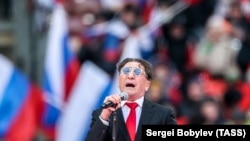BISHKEK -- Russian performers continue to feel the repercussions of Moscow’s war in Ukraine, with their concerts being canceled even in Russia-friendly Central Asian countries.
In the most recent cases, Russian rapper Alisher Morgenshtern and singer Grigory Leps had their performances scrapped in Kyrgyzstan and Kazakhstan, respectively, over their opposing stances on Ukraine.
Leps, 60, and Morgenshtern, 25, have entirely different views on the Ukraine war: Leps is on the European Union sanctions list for his vocal support of Kremlin policies, including its invasion of Ukraine. But Morgenshtern has been labelled a foreign agent in Russia after he criticized the war.
Morgenshtern was set to perform along with several other artists at the Alga Fest music festival in Bishkek on June 23.
But Kyrgyzstan’s Culture Ministry said in an official letter that it opposed the rapper’s attendance at the festival. The letter -- signed by Deputy Minister Chyngyz Esengul-uulu -- said the ministry was against events that are incompatible with Kyrgyz traditions and moral values.
Earlier, lawmaker Alisher Kozuev expressed concern over what he described as Morgenshtern’s “bad influence” on young people.
“He corrupts society,” Kozuev said, urging officials to “take action” to prevent him from performing.
Culture Minister Altynbek Maksutov swiftly agreed.
“We’re working [on it],” Maksutov said. “We have the same position as you regarding this matter, because there is a criminal case opened in Russia against Morgenshtern.”
Russian authorities have charged the artist with selling narcotics, a claim his lawyer has denied.
In the early days of the invasion, Morgenshtern’s lyrics accusing “big uncles sending [people] to slaughter” was seen by some as a thinly veiled reference to Russian President Vladimir Putin.
The young rapper, whose surname is Valeyev, was declared a foreign agent in May 2022.
Morgenshtern hails from the Russian republic of Bashkortostan and is currently based in the United Arab Emirates.
Earlier in June, the well-known Russian rock bank Pornofilmy had its concert in Bishkek canceled by officials. No explanation was given for the move. The group even tried to secretly perform at a smaller venue in the Kyrgyz capital but was stopped by security officials.
Guitarist and band leader Aleksandr Rusakov said he suspects pressure by the Kremlin led to the cancelation. The group has long been anti-Putin and has vocally opposed the war in Ukraine. The band -- which was founded in 2008 and is currently one of Russia’s most popular -- has relocated to Georgia.
'Accomplices In Murder'
Meanwhile in Kazakhstan, it’s been pressure by the public and activists that led to the cancelation of Leps’s concert in the city of Qonaev. The concert was scheduled for July 8.
Social media users, journalists, and activists condemned the organizers of the event for hosting a Russian artist who supports the war in Ukraine.
“Shame on you! You are accomplices in the killing of Ukrainians,” wrote journalist Dinara Yegeubaeva. “If we stay silent today, they will tomorrow start collecting money for bullets to hit us.”
Kazakh social media user Natalia Vasilenko called for a boycott against those whom she describes as “murderers-performers.”
“They sponsor the war with the money people pay for their concert tickets…. Kazakhstan is not a sponsor of fascist terrorists,” she wrote on Facebook.
On June 19, Almaty city lawmaker Erkin Raqyshev announced that the concert was canceled by "popular demand."
Leps -- aka Lepsveridze -- is a staunch supporter of what Moscow calls a “special military operation” in Ukraine. He has several times visited Russian-occupied cities in eastern Ukraine to perform for Russian soldiers.
Earlier in June, Leps and fellow pro-Kremlin Russian singer Nikolai Baskov pledged to pay 1 million rubles (about $11,900) to anyone who destroys Western-made tanks in Ukraine.
Kazakhstan in March cancelled the Zhara music festival at which pro-Kremlin Russian singers, including Leps, were due to perform. Authorities said the event was called off because of the "unstable situation in the world."
Neighboring Uzbekistan followed suit, cancelling the Zhara festival scheduled to take place in its capital, Tashkent, on May 20-21.
A Tashkent police spokesman was quoted as saying that the festival was scrapped “on an order from the Interior Ministry.”
Moscow's Leverage
Unlike its relatively prosperous neighbors, Kyrgyzstan can’t afford to upset Russia, according to a local expert.
Kyrgyzstan and Tajikistan are more “vulnerable” to Moscow’s pressures than Kazakhstan and Uzbekistan, said political affairs specialist Aida Alymbaeva.
Many households in Kyrgyzstan depend on remittances sent home by more than 1 million Kyrgyz migrants who work in Russia.
Russia can use it as a “leverage to influence the politics inside Kyrgyzstan,” Alymbaeva told Current Time.
Alymbaeva said Kyrgyzstan depends on Russia’s support in many sectors, including the defense industry, oil products, information technology, and security.
“Hence, our government always follows the lead of the Russian authorities. That’s why we did not block Russian state TV channels, that’s why every year our special service sends 20 of its employees to study at the academy of the Russian Federal Security Service,” Alymbaeva said.













